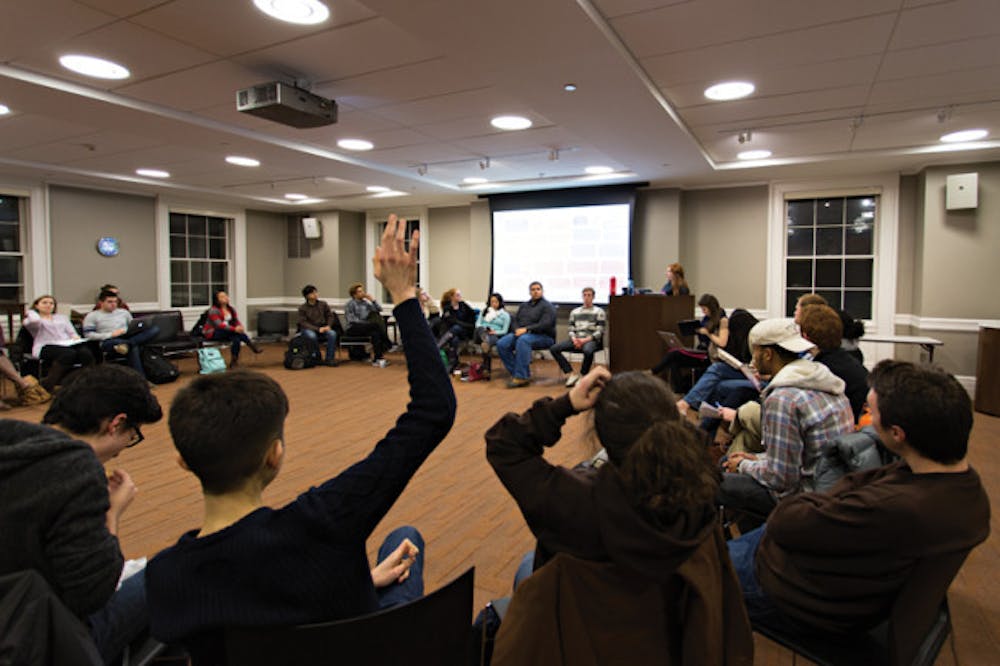The Undergraduate Council of Students will prioritize improving the individual student experience this semester, focusing on areas like mental health resources, faculty diversity and sexual assault policy change, UCS leaders said.
While many UCS priorities — including mental health and sexual assault policy — carry over from previous semesters, topics like student socioeconomic challenges and internal UCS restructuring will see newfound attention this semester.
Under the direction of President Sazzy Gourley ’16, the council will organize its efforts into five thematic categories: student wellness, diversity and inclusion, transparent University governance, campus life and curricular improvements, and UCS accountability. The five-pronged strategy will be the focus of discussion during the council’s first general body meeting Sept. 16, Gourley said.
“In order to be as proactive as possible, we’re trying to be as comprehensive as possible,” he said. “We’re trying to take a specific stance on what progress we hope to make in all of these areas.”
As campus conversation on sexual assault continues, UCS will make communicating policy changes and driving further changes a top agenda item. The council will aim to ensure that students understand the new Title IX processes, Gourley said. UCS will appoint undergraduates to the new Title IX Council and Title IX Oversight and Advisory Board, and it will hold a teach-in this semester to educate the community on issues the boards will address.
UCS will also concentrate efforts on student mental health and well-being. Last week, the Mental Health Community Council released its first report, which recommended eliminating the seven-session limit at Counseling and Psychological Services. The council will push the University to implement this recommendation and hopes administrators establish a “clear plan detailing the timeline and process for how that will happen,” Gourley said. The council will review recommendations for the improvement of mental health services and hold the University accountable for them, he added.
Increasing the diversity of Brown’s faculty remains a key UCS focus. The University will release the Diversity Action Plan this fall, and UCS will facilitate student feedback to the administration by hosting a focus group in September. UCS will also work to ensure that the University delivers on its pledge to double the number of underrepresented minority faculty members by 2024, Gourley said.
A number of UCS committees plan to tackle student socioeconomic obstacles. UCS will “make sure that administrators are sitting in on conversations about how we can change meal plans, summer storage or the way Brown does summer earnings expectations in order to make Brown more affordable to all students who come here,” said UCS Vice President Alana Bhatla ’16.
The UCS Campus Life committee will begin a long-term conversation about the format of meal plans, said committee chair Kevin Garcia ’18. It will also seek to clarify the housing process, including the housing lottery and arrangements needed for living off campus, he said.
“There’s not a lot of carry-over (from year to year) in terms of exactly knowing what you can expect in a certain building,” Garcia said. The committee has a housing guide in the works with the goal of saving students time and money, he said.
The UCS Academic and Administrative Affairs committee recently launched brown.texts.com, a textbook exchange website for the Brown community. Students can create an account for free and choose their selling price for old textbooks. “It’s a great cost-saving measure that is going to benefit a lot of students,” said Tim Ittner ’18, chair of the committee.
Together with its new initiatives, UCS has already undergone a number of internal changes intended to make the body more efficient and to clarify the roles of internally elected UCS officials. The Management Board, which assesses council structure and is led by the UCS chief of staff, was created by a resolution in April. Its primary focus is giving internally elected officials “an opportunity to be more accountable for what they were meant to do in the first place,” said Elena Saltzman ’16, the first UCS chief of staff.
Saltzman headed a summer working group that altered the process of joining UCS. Previously, new members were required to collect 150 signatures from undergraduates and attend the first UCS general body meeting. The new plan requires just 100 signatures and includes a more organized information session to educate new members on the structure and mission of UCS. “One of the beautiful things about UCS is that anyone can be a part of it, but it’s also very confusing for first-years who want to join,” Saltzman said.
The working group also evaluated weekly general body meetings, the main forum for UCS to publicize its work. This semester, in addition to these meetings, UCS will host a greater number of open forums and informal discussions, which will ideally include administrators and faculty members, Saltzman said.
A previous version of this article misspelled the name of the textbook exchange website, texts.brown.com. The Herald regrets the error.





